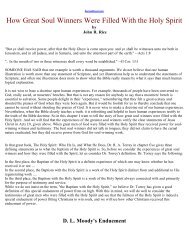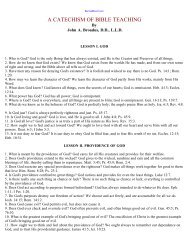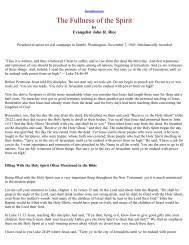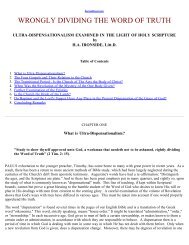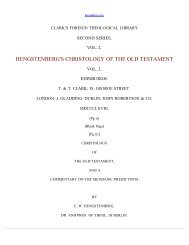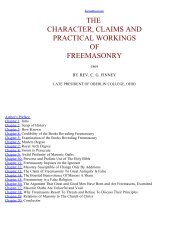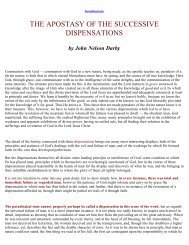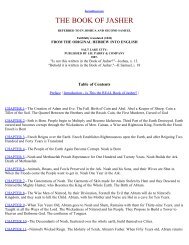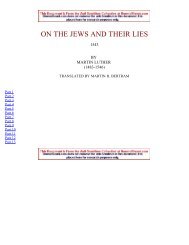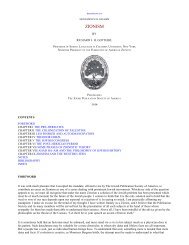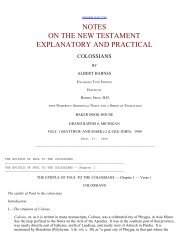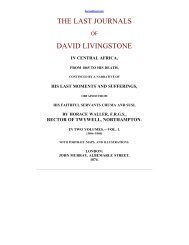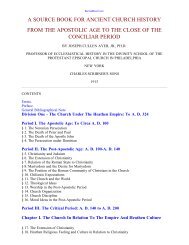Legends of Babylon and Egypt in Relation to Hebrew Tradition.pdf
Legends of Babylon and Egypt in Relation to Hebrew Tradition.pdf
Legends of Babylon and Egypt in Relation to Hebrew Tradition.pdf
You also want an ePaper? Increase the reach of your titles
YUMPU automatically turns print PDFs into web optimized ePapers that Google loves.
It is an <strong>in</strong>terest<strong>in</strong>g fact that Ziusudu should be described simply as "the k<strong>in</strong>g", without any <strong>in</strong>dication <strong>of</strong> the city or area<br />
he ruled; <strong>and</strong> <strong>in</strong> three <strong>of</strong> the five other passages <strong>in</strong> the text <strong>in</strong> which his name is mentioned it is followed by the same<br />
title without qualification. In most cases Berossus tells us the cities from which his Antediluvian rulers came; <strong>and</strong> if<br />
the end <strong>of</strong> the l<strong>in</strong>e had been preserved it might have been possible <strong>to</strong> determ<strong>in</strong>e def<strong>in</strong>itely Ziusudu's city, <strong>and</strong><br />
<strong>in</strong>cidentally the scene <strong>of</strong> the Deluge <strong>in</strong> the Sumerian Version, by the name <strong>of</strong> the deity <strong>in</strong> whose service he acted as<br />
priest. We have already noted some grounds for believ<strong>in</strong>g that his city may have been Shuruppak, as <strong>in</strong> the <strong>Babylon</strong>ian<br />
Version; <strong>and</strong> if that were so, the div<strong>in</strong>e name reads as "the God <strong>of</strong> Shurrupak" should probably be res<strong>to</strong>red at the end<br />
<strong>of</strong> the l<strong>in</strong>e.[1]<br />
[1] The rema<strong>in</strong>s that are preserved <strong>of</strong> the determ<strong>in</strong>ative, which is not comb<strong>in</strong>ed with the sign EN, proves that Enki's<br />
name is not <strong>to</strong> be res<strong>to</strong>red. Hence Ziusudu was not priest <strong>of</strong> Enki, <strong>and</strong> his city was probably not Eridu, the seat <strong>of</strong> his<br />
div<strong>in</strong>e friend <strong>and</strong> counsellor, <strong>and</strong> the first <strong>of</strong> the Antediluvian cities. Sufficient reason for Enki's <strong>in</strong>tervention on<br />
Ziusudu's behalf is furnished by the fact that, as God <strong>of</strong> the Deep, he was concerned <strong>in</strong> the proposed method <strong>of</strong> man's<br />
destruction. His rivalry <strong>of</strong> Enlil, the God <strong>of</strong> the Earth, is implied <strong>in</strong> the <strong>Babylon</strong>ian Version (cf. Gilg. Epic. XI, ll. 39-<br />
42), <strong>and</strong> <strong>in</strong> the Sumerian Version this would naturally extend <strong>to</strong> Anu, the God <strong>of</strong> Heaven.<br />
The employment <strong>of</strong> the royal title by itself accords with the tradition from Berossus that before the Deluge, as <strong>in</strong> later<br />
periods, the l<strong>and</strong> was governed by a succession <strong>of</strong> supreme rulers, <strong>and</strong> that the hero <strong>of</strong> the Deluge was the last <strong>of</strong> them.<br />
In the Gilgamesh Epic, on the other h<strong>and</strong>, Ut-napishtim is given no royal nor any other title. He is merely referred <strong>to</strong><br />
as a "man <strong>of</strong> Shuruppak, son <strong>of</strong> Ubar-Tutu", <strong>and</strong> he appears <strong>in</strong> the guise <strong>of</strong> an ancient hero or patriarch not <strong>in</strong>vested<br />
with royal power. On this po<strong>in</strong>t Berossus evidently preserves the orig<strong>in</strong>al Sumerian traditions, while the <strong>Hebrew</strong><br />
Versions resemble the Semitic- <strong>Babylon</strong>ian narrative. The Sumerian conception <strong>of</strong> a series <strong>of</strong> supreme Antediluvian<br />
rulers is <strong>of</strong> course merely a reflection from the his<strong>to</strong>rical period, when the hegemony <strong>in</strong> <strong>Babylon</strong>ia was contested<br />
among the city-states. The growth <strong>of</strong> the tradition may have been encouraged by the early use <strong>of</strong> /lugal/, "k<strong>in</strong>g", which,<br />
though always a term <strong>of</strong> secular character, was not very sharply dist<strong>in</strong>guished from that <strong>of</strong> /patesi/ <strong>and</strong> other religious<br />
titles, until, <strong>in</strong> accordance with political development, it was required <strong>to</strong> connote a wider dom<strong>in</strong>ion. In Sumer, at the<br />
time <strong>of</strong> the composition <strong>of</strong> our text, Ziusudu was still only one <strong>in</strong> a long l<strong>in</strong>e <strong>of</strong> <strong>Babylon</strong>ian rulers, ma<strong>in</strong>ly his<strong>to</strong>rical<br />
but gradually reced<strong>in</strong>g <strong>in</strong><strong>to</strong> the realms <strong>of</strong> legend <strong>and</strong> myth. At the time <strong>of</strong> the later Semites there had been more than<br />
one complete break <strong>in</strong> the tradition <strong>and</strong> the his<strong>to</strong>rical sett<strong>in</strong>g <strong>of</strong> the old s<strong>to</strong>ry had become dim. The fact that <strong>Hebrew</strong><br />
tradition should range itself <strong>in</strong> this matter with <strong>Babylon</strong> rather than with Sumer is important as a clue <strong>in</strong> trac<strong>in</strong>g the<br />
literary his<strong>to</strong>ry <strong>of</strong> our texts.<br />
The rest <strong>of</strong> the column may be taken as descriptive <strong>of</strong> Ziusudu's activities. One l<strong>in</strong>e records his mak<strong>in</strong>g <strong>of</strong> some very<br />
great object or the erection <strong>of</strong> a huge build<strong>in</strong>g;[1] <strong>and</strong> s<strong>in</strong>ce the follow<strong>in</strong>g l<strong>in</strong>es are concerned solely with religious<br />
activities, the reference is possibly <strong>to</strong> a temple or some other structure <strong>of</strong> a sacred character. Its foundation may have<br />
been recorded as strik<strong>in</strong>g evidence <strong>of</strong> his devotion <strong>to</strong> his god; or, s<strong>in</strong>ce the verb <strong>in</strong> this sentence depends on the words<br />
"at that time" <strong>in</strong> the preced<strong>in</strong>g l<strong>in</strong>e, we may perhaps regard his action as directly connected with the revelation <strong>to</strong> be<br />
made <strong>to</strong> him. His personal piety is then described: daily he occupied himself <strong>in</strong> his god's service, prostrat<strong>in</strong>g himself <strong>in</strong><br />
humility <strong>and</strong> constant <strong>in</strong> his attendance at the shr<strong>in</strong>e. A dream (or possibly dreams), "such as had not been before",<br />
appears <strong>to</strong> him <strong>and</strong> he seems <strong>to</strong> be further described as conjur<strong>in</strong>g "by the Name <strong>of</strong> Heaven <strong>and</strong> Earth"; but as the ends<br />
<strong>of</strong> all these l<strong>in</strong>es are broken, the exact connexion <strong>of</strong> the phrases is not quite certa<strong>in</strong>.<br />
[1] The element /gur-gur/, "very large" or "huge", which occurs <strong>in</strong> the name <strong>of</strong> this great object or build<strong>in</strong>g, /an-saggur-gur/,<br />
is employed later <strong>in</strong> the term for the "huge boat", /(gish)ma-gur- gur/, <strong>in</strong> which Ziusudu rode out the s<strong>to</strong>rm.<br />
There was, <strong>of</strong> course, even at this early period a natural tendency <strong>to</strong> picture on a superhuman scale the lives <strong>and</strong> deeds<br />
<strong>of</strong> remote predecessors, a tendency which <strong>in</strong>creased <strong>in</strong> later times <strong>and</strong> led, as we shall see, <strong>to</strong> the elaboration <strong>of</strong><br />
extravagant detail.<br />
It is difficult not <strong>to</strong> associate the reference <strong>to</strong> a dream, or possibly <strong>to</strong> dream-div<strong>in</strong>ation, with the warn<strong>in</strong>g <strong>in</strong> which Enki<br />
reveals the purpose <strong>of</strong> the gods. For the later versions prepare us for a reference <strong>to</strong> a dream. If we take the l<strong>in</strong>e as<br />
describ<strong>in</strong>g Ziusudu's practice <strong>of</strong> dream-div<strong>in</strong>ation <strong>in</strong> general, "such as had not been before", he may have been<br />
represented as the first div<strong>in</strong>er <strong>of</strong> dreams, as Enmeduranki was held <strong>to</strong> be the first practitioner <strong>of</strong> div<strong>in</strong>ation <strong>in</strong> general.<br />
But it seems <strong>to</strong> me more probable that the reference is <strong>to</strong> a particular dream, by means <strong>of</strong> which he obta<strong>in</strong>ed<br />
knowledge <strong>of</strong> the gods' <strong>in</strong>tentions. On the render<strong>in</strong>g <strong>of</strong> this passage depends our <strong>in</strong>terpretation <strong>of</strong> the whole <strong>of</strong> the



